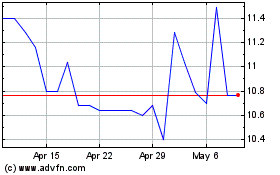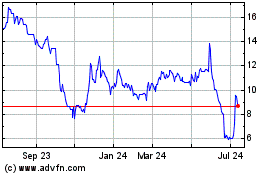Aeterna Zentaris Inc. (NASDAQ: AEZS) (TSX: AEZS) (“Aeterna” or the
“Company”), a specialty biopharmaceutical company developing and
commercializing a diversified portfolio of pharmaceutical and
diagnostic products, today announced it has expanded the scope of
its existing research program with the
Julius-Maximilians-University Wuerzburg (“JMU”), on the development
of COVID-19 and Chlamydia trachomatis vaccines. The expanded
research activities will leverage JMU’s program involving
three-dimensional models (“3D models”) of human intestinal tissues
to study infection biology in the gut, the site of Salmonella
primary action. The Company expects this approach to generate more
relevant and predictive additional data for the regulatory process,
while reducing the number of costly and time-consuming animal
experiments.
Aeterna’s innovative vaccine technology aims to
induce mucosal immunity for the potential prevention of infections
and is designed to use two antigens for better protection against
escape mutants of the pathogens, both believed to be advantageous
features when compared to current vaccines.
“As coordinator of the Graduate College “3D
Infect”, funded by the German Research Foundation, Prof. Rudel’s
experience speaks for itself, and we believe that will be a
tremendous asset to our efforts. He is already involved in the
Inno4vac project supported by the European Innovative Medicines
Initiative 2, focused on the design and application of advanced
predictive human models for the development of vaccines,” commented
Dr. Klaus Paulini, Chief Executive Officer of Aeterna Zentaris. “We
are very pleased to broaden our scientific collaboration with Prof.
Rudel and his group at JMU.”
Prof. Dr. Thomas Rudel of JMU, added,
"Salmonella Typhi, the vaccine platform carrier strain used in the
Aeterna vaccine program, is an obligatory human-pathogenic
bacterium, which is taken up by specific mucosal cells of the human
gastrointestinal tract. Direct contact to the
mucosa-associated-lymphoid-tissue (MALT) induces a strong immune
response. The high specificity of our Salmonella Typhi Ty21a
vaccine strain for human tissue limits a validation in the complex
intestinal tissues of animal models.”
Background
In March 2021, Aeterna entered into an exclusive
license agreement where the Company was granted an exclusive,
world-wide, license to certain patent applications and know-how
owned by JMU to research and develop, manufacture and sell a
potential COVID-19 vaccine. The Company’s vaccine platform is
currently undergoing pre-clinical studies for the prevention of
coronavirus diseases, including COVID-19 (SARS-CoV-2).
In September 2021, the Company exercised its
option under the agreement with the JMU on a second indication,
Chlamydia. Chlamydia trachomatis is a sexually transmitted
bacterium infecting over 130 million people annually. Asymptomatic
disease can spread to the reproductive tract eventually inducing
infertility, miscarriage, or ectopic pregnancy, which is a
life-threatening condition. Ocular infections can lead to inclusion
conjunctivitis or trachoma, which is the primary source of visual
impairment or infectious blindness.
Additionally, the Company entered into a
research agreement under which it has engaged JMU on a
fee-for-service basis to conduct supplementary research activities
and pre-clinical development studies on the potential vaccines, the
results of which are covered within the scope of the license
agreements. Under the expanded research program announced today,
JMU will validate and utilize innovative human 3D intestinal tissue
models to study the infection biology of Salmonella strains towards
clinical development.
Additionally, Prof. Dr. Thomas Rudel of JMU was
engaged by the Company in September 2021 as a scientific consultant
to support development of the salmonella-based vaccine platform for
Coronavirus and Chlamydia.
About the
Salmonella-Based
Vaccine Platform
The technology underlying the new vaccine
approach is based on the bacterium Salmonella Typhi Ty21a which has
been engineered to express and secrete up to two coronavirus or
Chlamydia trachomatis antigens fused to immunological adjuvant
peptides. The plasmid-maintenance system is believed to be free of
antibiotic resistance genes. The specific bacterial vector strain
is designed to enable oral application and release of the proteins
into the gut system which will consequently via M-cells stimulate
mucosal and systemic immunity. The Salmonella Typhi Ty21a carrier
strain has been safely used worldwide in more than 150 million
administered doses of other vaccine products. Some of those
existing vaccine products have been shown to be stable at fridge
temperature of 2°C to 8°C. While the use and characteristics of
Aeterna’s vaccine candidates remain to be demonstrated through
further preclinical and clinical studies, the goal is to develop
vaccines which can induce mucosal immunity efficiently preventing
infection.
About Aeterna Zentaris Inc.
Aeterna Zentaris is a specialty
biopharmaceutical company developing and commercializing a
diversified portfolio of pharmaceutical and diagnostic products
focused on areas of significant unmet medical need. The Company's
lead product, macimorelin (Macrilen™), is the first and only U.S.
FDA and European Commission approved oral test indicated for the
diagnosis of adult growth hormone deficiency (AGHD). The Company is
leveraging the clinical success and compelling safety profile of
macimorelin to develop it for the diagnosis of childhood-onset
growth hormone deficiency (CGHD), an area of significant unmet
need, in collaboration with Novo Nordisk.
Aeterna Zentaris is dedicated to the development
of therapeutic assets and has recently taken steps to establish a
growing pre-clinical pipeline to potentially address unmet medical
needs across a number of indications, including neuromyelitis
optica spectrum disorder (NMOSD), Parkinson's disease (PD),
hypoparathyroidism and amyotrophic lateral sclerosis (ALS; Lou
Gehrig's disease). Additionally, the Company is developing an oral
prophylactic bacterial vaccine against SARS-CoV-2 (COVID-19) and
Chlamydia trachomatis.
For more information, please visit
www.zentaris.com and connect with the Company on Twitter, LinkedIn
and Facebook.
Forward-Looking Statements
This press release contains statements that may
constitute forward-looking statements within the meaning of U.S.
and Canadian securities legislation and regulations and such
statements are made pursuant to the safe-harbor provision of the
U.S. Securities Litigation Reform Act of 1995. Forward-looking
statements are frequently, but not always, identified by words such
as “expects,” “anticipates,” “believes,” “intends,” “potential,”
“possible,” “designed,” “aim” and similar expressions. Such
statements, based as they are on current expectations of
management, inherently involve numerous risks, uncertainties and
assumptions, known and unknown, many of which are beyond our
control. Forward-looking statements in this press release include,
but are not limited to, those relating to: Aeterna’s expectations
with respect to the potential of Aeterna’s COVID-19 and Chlamydia
Trachomatis vaccine program to achieve any particular result,
including the potential of the 3D Models to generate more relevant
and predictive additional data for the regulatory process while
reducing the number of costly and time-consuming animal
experiments, the potential of the vaccines to induce mucosal
immunity and prevent protection against either COVID-19 or
Chlamydia Trachomatis (including escape mutants and the
characteristics and potential of those vaccines.
Forward-looking statements involve known and
unknown risks and uncertainties, and other factors which may cause
the actual results, performance or achievements stated herein to be
materially different from any future results, performance or
achievements expressed or implied by the forward-looking
information. Such risks and uncertainties include, among others,
the COVID-19 and Chlamydia Trachomatis vaccine platform technology
(and any vaccine candidates using that technology) licensed from
the University of Wuerzburg has never been tested in humans and so
further pre-clinical or clinical studies of that technology and any
vaccine developed using that technology may not be effective as a
vaccine against either COVID-19 (or any other coronavirus disease)
or Chlamydia Trachomatis; the timeline to develop a vaccine may be
longer than expected; such technology or vaccines may not be
capable of being used orally or stored at refridgerated
temperatures, may not have the same characteristics as vaccines
previously approved using the Salmonella Typhi Ty21a carrier
strain; the vaccines under development may not be successful or may
not support advancing the product to human clinical trials; our
ability to raise capital and obtain financing to continue our
currently planned operations; our now heavy dependence on the
success of Macrilen™ (macimorelin) and related out-licensing
arrangements and the continued availability of funds and resources
to successfully commercialize the product, including our heavy
reliance on the success of the license agreement and the amended
license agreement (collectively the Novo Amended License
Agreement); the global instability due to the global pandemic of
COVID-19 and geopolitical events (including the war in the
Ukraine), and its unknown potential effect on our planned
operations; our ability to enter into out-licensing, development,
manufacturing, marketing and distribution agreements with other
pharmaceutical companies and keep such agreements in effect; and
our ability to continue to list our common shares on the NASDAQ.
Investors should consult our quarterly and annual filings with the
Canadian and U.S. securities commissions for additional information
on risks and uncertainties, including those risks discussed in our
Annual Report on Form 40-F and annual information form, under the
caption "Risk Factors". Given the uncertainties and risk factors,
readers are cautioned not to place undue reliance on these
forward-looking statements. We disclaim any obligation to update
any such factors or to publicly announce any revisions to any of
the forward-looking statements contained herein to reflect future
results, events or developments, unless required to do so by a
governmental authority or applicable law.
No securities regulatory authority has either
approved or disapproved of the contents of this news release. The
Toronto Stock Exchange accepts no responsibility for the adequacy
or accuracy of this release.
Investor Contact:
Jenene ThomasJTC TeamT (US): +1 (833) 475-8247E:
aezs@jtcir.com
Aeterna Zentaris (TSX:AEZS)
Historical Stock Chart
From Mar 2024 to Apr 2024

Aeterna Zentaris (TSX:AEZS)
Historical Stock Chart
From Apr 2023 to Apr 2024
